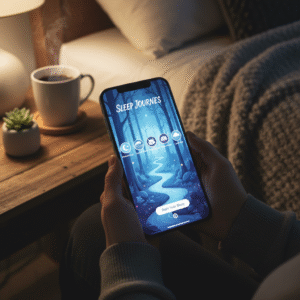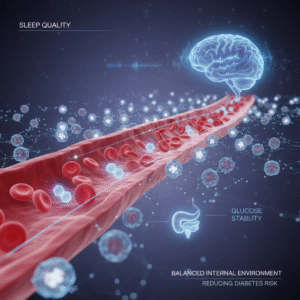Discover how insomnia can impact not only patients but also healthcare providers — reducing empathy, increasing error risks, and affecting the quality of care delivered.
Insomnia Affects More Than Just Patients
The Science: Insomnia and Empathy in Clinical Practice
Researchers surveyed 97 healthcare professionals using a 28-item empathy scale. The results were striking: insomnia symptoms were linked to significantly lower empathy scores.
This matters deeply. A provider’s reduced ability to emotionally connect with patients can:
- Increase patient anxiety
- Reduce trust and satisfaction
- Raise the risk of communication errors and misjudgments
Sleep loss doesn’t just affect mood — it can fundamentally undermine care quality.
A High-Stress Field with a High Sleep Burden
While 30–35% of adults experience insomnia symptoms, healthcare workers face a uniquely intense risk due to:
- Long shifts and night rotations
- High stress levels
- Emotional burnout
These factors often make it harder for them to get quality sleep — yet their jobs demand peak empathy and decision-making.
“When those responsible for your care are sleep-deprived, your treatment may suffer in subtle but serious ways.”
Insomnia’s Wider Impact on Performance and Mood
Sleep deprivation among healthcare workers goes beyond empathy. Common effects include:
- Slower reaction times
- Poor concentration and memory
- Decreased motivation
- Increased risk of mistakes
This directly affects tasks like medication accuracy, diagnosis clarity, and communication with patients and families.
Sleep Hygiene Isn’t Just for Patients
Encouraging sleep hygiene practices like consistent sleep/wake times, screen limits, and proper rest environments is critical — not just for patients, but for healthcare providers themselves.
- Good sleep promotes:
- Emotional regulation
- Clear thinking
- Stronger interpersonal connection
Which means better care for everyone involved.
Conclusion
Insomnia doesn’t just affect the person experiencing it — it can quietly shape the quality of healthcare. When providers lack sleep, empathy drops, judgment fades, and patients may suffer the consequences. Recognizing sleep as a vital component of professional effectiveness in medicine is the first step in creating a healthier system for all.
Frequently Asked Question
How does poor sleep in providers impact patient care?
Fatigue reduces concentration and emotional awareness, increasing the risk of communication failures and diagnostic mistakes. Sleep is crucial for high-quality, patient-centered care.
Can insomnia really affect how well a doctor understands me?
Yes. A recent study showed healthcare workers with insomnia symptoms scored lower on empathy tests. This can lead to less understanding and connection during clinical visits.
Sources
Mayo Clinic – Insomnia: Symptoms and Causes:
https://www.mayoclinic.org/diseases-conditions/insomnia/symptoms-causes/syc-20351771WebMD – Insomnia Overview:
https://www.webmd.com/sleep-disorders/insomnia-overviewWHO – Sleep Disorders Fact Sheet:
https://www.who.int/news-room/fact-sheets/detail/sleep-disorders








